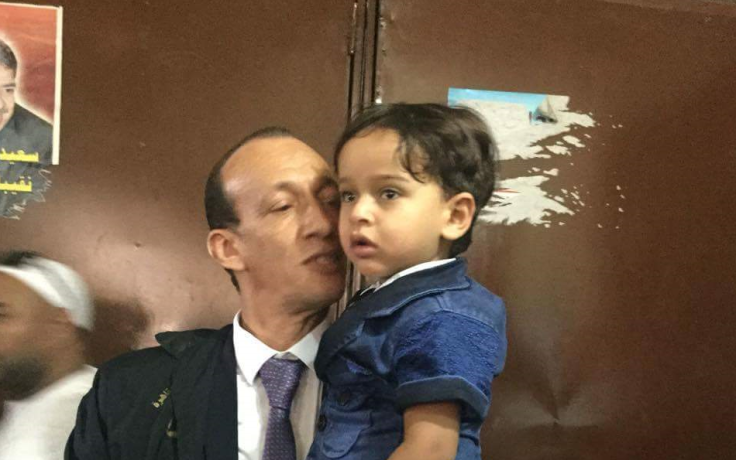Egypt puts three-year-old on trial for reckless driving, resisting arrest and robbery
Ziad Qanawi - who appeared in court on the arm of his lawyer - still has 14 charges outstanding.

Ziad Qanawi, a toddler, has been appearing in Cairo's courts for the past month. The three-year-old has been carried on his lawyer Mahmoud El Shenawy's arms every time he appears before a judge. He has been charged with robbery and resisting arrest
"It's an absolute catastrophe. These are all fabricated cases. This is outside the legal confines of any country and I can't believe that we are going through all this heartache," Shenawy told IBTimes UK.
Shenawy claims that his young client has been cleared of three cases but still has 14 outstanding, all on the same charges. The flamboyant lawyer, who appears on talk shows with the toddler in tow, notes that resisting arrest falls within the recently legislated and widely condemned repressive counter-terrorism law.
In absurd scenes, he has gone from one court to the next throughout Cairo and its outskirts convincing judges that Qanawi did not commit the alleged crimes. His next court appearance is scheduled for late September.
"When I walked in and the judge asked for the defendant he baulked when I told him that this was Ziad. He thought I was joking with him and I had to hand over his birth certificate to prove that he could not have possibly committed these crimes," he explained.
A high-ranking security official involved with the government-run quarry administration, according to Shenawy, has been issuing warrants that have been presented to the prosecution because of a dispute with Qanawi's father, a construction contractor. The officer, who has judicial arrest powers – an arcane part of a 1978 Egyptian law – alleges that the toddler Ziad stole building materials from construction sites around Cairo.
"You've destroyed his future, while the pacifier is still in his mouth".
Judicial arrest power can be bestowed with permission from the Justice Ministry in all sectors of public life. Earlier this year the musicians' syndicate was granted such powers. The security official further argues in the warrants that the three-year-old was driving negligently, endangering citizens' lives, when confronted by authorities.
The truck the official claims the toddler was driving recklessly to escape arrest is registered in Qanawi's name under his father's guarantee.
Hassan Qanawi, his father, only found out about the charges when his son was placed on a no fly list for outstanding convictions and they were barred to travelling to Saudi Arabia for the Hajj in July. Shenawy finds this ludicrous and a gross insult to his profession, but the case is one of the latest blunders from a highly-politicised judiciary.
"This is a tragi-comic farce situation and it keeps on getting more absurd by the day," he said.
Since Mohammed Morsi's ousting in July 2013, when Qanawi was also born, thousands have been sentenced to death in what human rights groups claim are unfair trials based on trumped-up charges.
In February this year, an Egyptian military court convicted a four-year-old for committing multiple murders in a case of mistaken identity. Also this year, a satirical street theatre troupe have been languishing in jail and others including novelist Ahmed Naji, a PEN award winner. Hisham Geneina, formerly the country's chief auditor, was placed under house arrest and was sentenced to one year in prison earlier this month for publishing a report detailing the endemic scale of corruption.
Egypt ranked in the bottom 20 countries on the World Justice Project's Rule of Law Index last year, which measures how well courts function.
President Abdel Fattah El Sisi maintains that the judiciary is politically independent. However insulting the once reputable institution can land people in prison, as it is considered a crime.
Yet for the family of Qanawi, who has been dubbed 'The Baby Bottle Boy' in local media, such concerns do not matter, according to their lawyer.
He stressed to IBTimes UK that the legal tool has been abused for far too long and the justice ministry should be proactive in its reforms. The justice ministry itself has been embroiled with its own political blunders, sending thousands to jail in recent years.
"You can't just oppress people like this with unchecked power," Shenawy said.
Even though Shenawy has been heartened that judges have thrown out the case, he lamented that Qanawi's life chances might be jeopardised even after his name is cleared in a clogged courts system. "You've destroyed his future, while the pacifier is still in his mouth," he mourns.
© Copyright IBTimes 2025. All rights reserved.






















